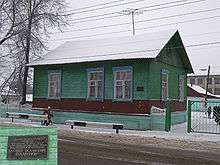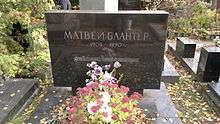Matvey Blanter
Matvei Isaakovich Blanter (Russian: Матве́й Исаа́кович Бла́нтер) (10 February [O.S. 28 January] 1903 – 27 September 1990) was one of the most prominent composers of popular songs and film music in the Soviet Union.[1] Among many other works, he wrote the internationally famous "Katyusha" (1938), performed to this day internationally. He was active as a composer until 1975, producing more than two thousand songs.
Childhood and education

Blanter, the son of a Jewish craftsman, was born in the town of Pochep, then in the Chernigov Governorate of the Russian Empire. He studied piano and violin at the Kursk Higher Music School. In 1917-1919, he continued his education in Moscow, studying violin and composition.
Career
Blanter's first songs were composed in the 1920s. At the time, he wrote light dance and jazz music, including "John Gray" (1923), a foxtrot that became a major hit. In the 1930s, as Soviet culture grew more ideologically strict, Blanter shifted toward writing Soviet propaganda songs. He emerged as one of the creators of the Soviet "mass song".
Some of Blanter's 1930s songs were styled after the Red Army songs of the Russian Civil War (1918–1921) and mythologized the war's Bolshevik heroes. The most famous among these are "The Song of Shchors" (1935), telling the tale of Ukrainian Red Army commander Nikolai Shchors, and "Partisan Zheleznyak" (1936), which combines the energetic rhythms of a military marching song with elements of a mournful ballad as it describes Commander Zheleznyak's heroic death in battle (the song opens and closes with a stanza about Zheleznyak's lonely burial mound in the steppes).
Other notable Blanter songs from that period include "Youth" (1937), a cheerful marching song asserting that "right now, everyone is young in our young, beautiful country"; "Stalin Is Our Battle-Glory" (1937), a widely performed hymn to Joseph Stalin; and "The Football March" (1938), music from which is still performed at the start of every soccer match in Russia.
In 1938, Blanter began his long-lasting collaboration with the poet Mikhail Isakovsky. Their first song, undoubtedly the most famous of Blanter's works, was the world-renowned "Katyusha". In it, Blanter combined elements of the heroic, upbeat battle song and of a peasant song representing a woman's lamentation for an absent lover. Standing on a high riverbank, a young woman, Katyusha, sings of her beloved (compared to "a gray eagle of the steppes"), who is far away serving on the Soviet border. The theme of the song is that the soldier will protect the Motherland and its people while his girl will preserve their love. While the song is joyful and filled with the imagery of a fertile, blooming land, it also conveys the sense that the motherland is under threat. "Katyusha" gained fame during World War II as an inspiration to defend one's land from the enemy.
Blanter wrote several other highly popular wartime songs. His 1945 song, "The Enemy Burned Down His Home", about a soldier who returns from the front to find his entire family dead, became controversial when the authorities deemed it too pessimistic and banned its performance; it was performed for the first time in 1961.
Blanter's postwar songs include "The Migrant Birds Are Flying" (1949), a patriotic Soviet song in which the narrator watches migratory birds fly away and asserts that he can think of no better place to be than the Motherland, and "Dark-Eyed Cossack Girl" (Russian: Черноглазая казачка), written especially for the bass-baritone Leonid Kharitonov.[2]

In 1983, Blanter became a member of the Anti-Zionist Committee of the Soviet Public, an organization created by the Soviet Union as a tool against Israeli's alleged aggression against its Arab neighbours. He died in Moscow in 1990.
Awards and honors
- Stalin Prize (1946) (for the songs "Under the Balkan Stars", "In a way, a path far", "My beloved", "In the forest, front-line")
- Honoured Artist of the RSFSR (1947)
- People's Artist of the RSFSR (1965)
- Order of the Badge of Honour (1967)
- People's Artist of the USSR (1975)
- Hero of Socialist Labour (1983)
References in popular culture
Ayn Rand's 1936 novel We the Living, set in Petrograd in 1923-1925, has a passage devoted to the huge popularity of "John Gray."
In the 1996 novel The Last Battle,[3] Cornelius Ryan records that Blanter accompanied the Red Army into Berlin during the last days of the war and the collapse of Nazi power.
Blanter was present at a hastily convened conference on May 1, 1945, a few hours after Hitler's suicide, between Colonel-General Vasily Ivanovich Chuikov and Lieutenant-General Hans Krebs, Chief of the OKW, to negotiate surrender of the city. Krebs noted later that there were several Russian 'senior officers' present, yet Chuikov introduced none of them to Krebs: the others were in fact merely war correspondents and interpreters, not military staff - Chuikov had not been able to assemble his staff at such short notice.
In a footnote, Ryan adds:
With the two correspondents... was a visiting Soviet composer, Matvei Isaakovich Blanter, sent by Stalin to write a symphony commemorating the Berlin victory. The correspondents asked the General what to do with the composer, and Chuikov said 'Bring him along.' But when Blanter arrived he was wearing civilian clothes, and it was clear that he could not be passed off as a Red Army officer. He was hastily shoved into a clothes closet adjoining the meeting room. He stayed there for most of the ensuing conference. Just before the visitors left, he fainted from lack of air and fell into the room, to the utter astonishment of the Germans.
It appears that no such symphony was ever composed.
References
- ↑ Jack Miller (1983). Jews in Soviet Culture. Transaction Publishers. p. 79. ISBN 978-1-412-82694-5.
- ↑ "Singer Leonid Kharitonov". Video of "Dark-Eyed Cossack" sung by Leonid Kharitonov, 1969 (in Russian). Retrieved 2009-10-08.
- ↑ Ryan, Cornelius. The Last Battle. London: Collins, 1966. ISBN 0-00-613267-7